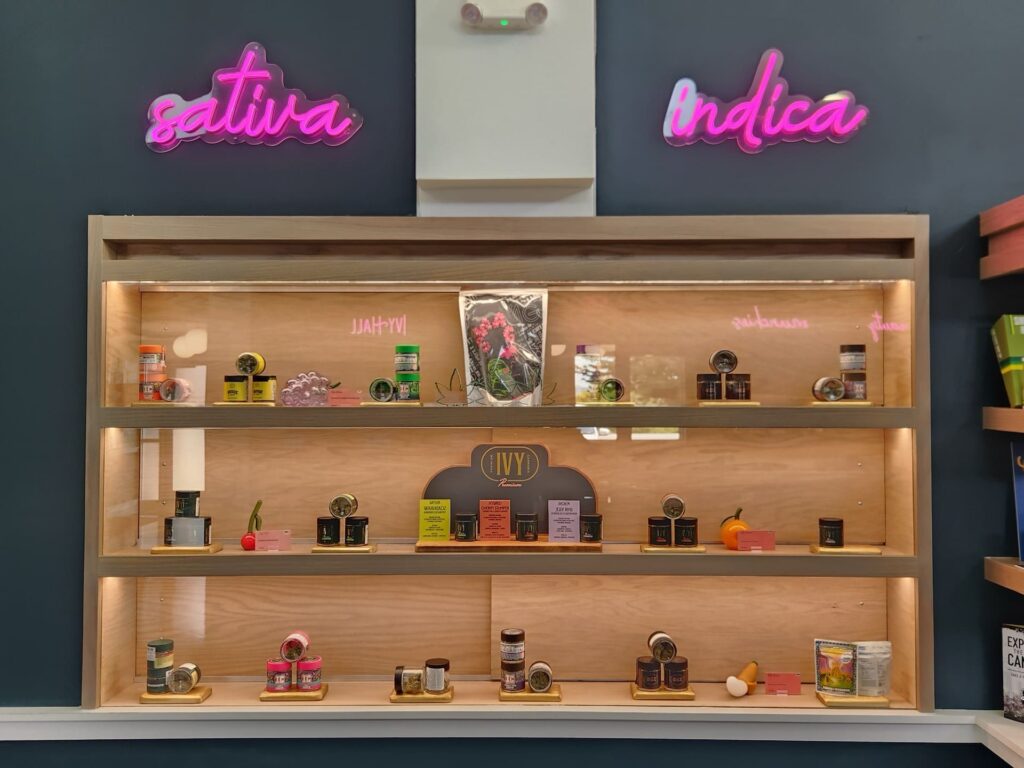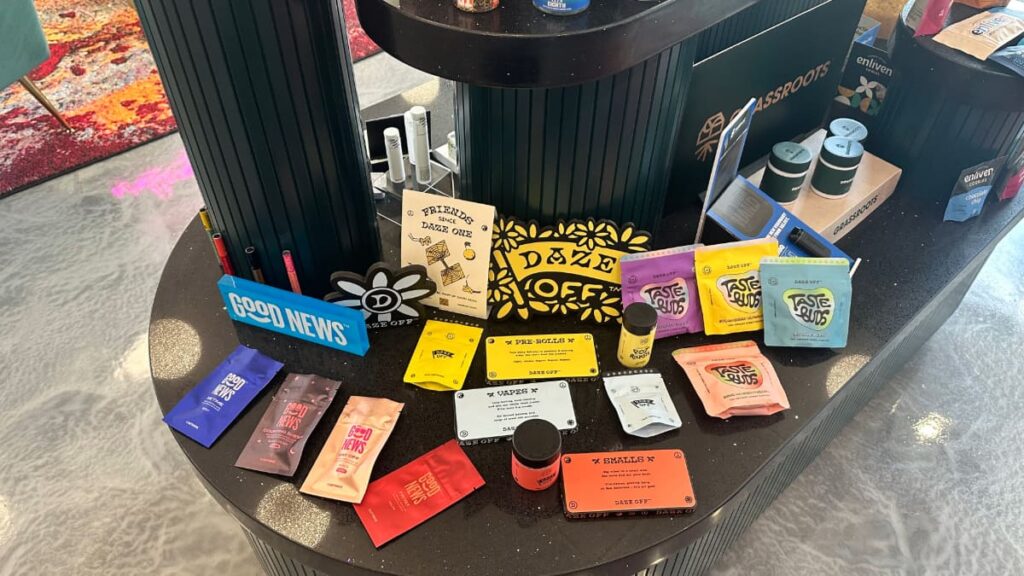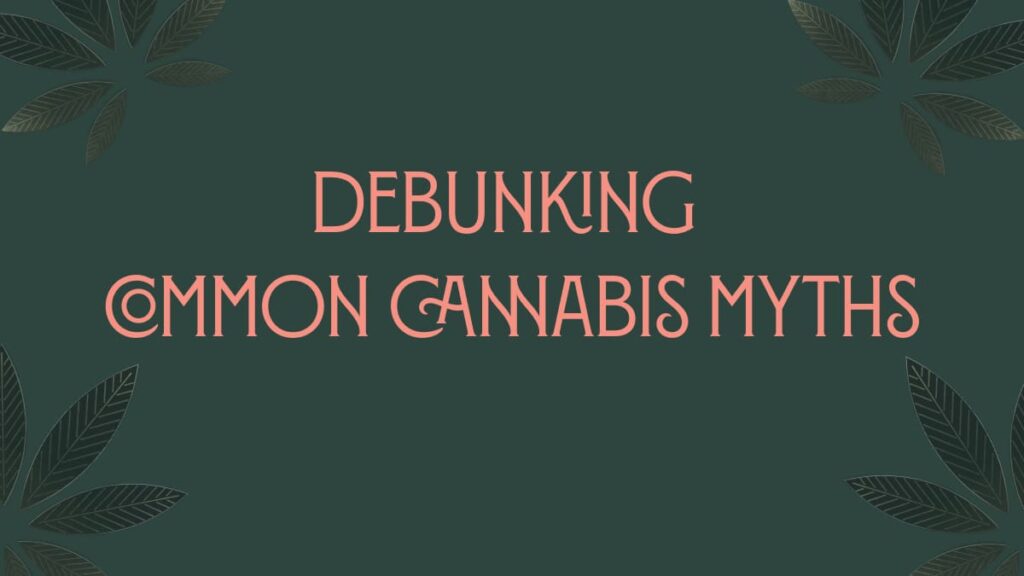With the rise in popularity – and increase in legalization – of cannabis, there is a vast amount of cannabis information available to the public. Unfortunately, a significant amount of it is untrue. In fact, there are still a lot of myths floating around regarding cannabis and cannabis products.
Debunking common cannabis myths is crucial to help the public separate fact from fiction. Stereotypes and misinformation can be damaging, not only medically but also socially. As your friendly neighborhood cannabis dispensary, Ivy Hall prioritizes offering a welcoming environment to experience the sensory effects of cannabis, and we’re passionate about educating people about our favorite plant. To help prevent the spread of misinformation and increase your cannabis know-how so you can make a more informed decision about the products you choose, read on as we discuss some common myths about marijuana.
Myth: Cannabis Is a Gateway Drug
One common misconception is that cannabis use is the primary gateway to the use of dangerous street drugs. However, anecdotal evidence has frequently shown us that people who use these dangerous drugs often do not start with cannabis. Thus, cannabis shouldn’t be blamed for the use of dangerous drugs. A more accurate assessment would be that individual predispositions and social environments play a significant role in drug use patterns, and some of these individuals also choose to use cannabis.
In fact, there aren’t many studies that provide evidence that cannabis use leads to the use of more serious drugs such as methamphetamine, cocaine, or heroin. Many believe it could be argued that cannabis use does the opposite. The use of marijuana could prevent the use of other drugs because it decreases the craving for other substances.
Myth: Cannabis Is Addictive
Another common misconception is that cannabis is always addictive. Contrary to popular belief, cannabis actually has a low potential for dependency, especially when compared to tobacco or alcohol. Additionally, in some cases, cannabis has been found to help individuals struggling with substance use disorders because it can mitigate withdrawal symptoms.
This isn’t to say an individual could not become addicted to cannabis. It’s important to remember that everything must be done in moderation. Cannabis addiction can be possible for some people, but because the sensory high is so desirable. In addition, people who struggle with disorders such as anxiety, depression, schizophrenia, or bipolar disorder could have a higher propensity to become dependent on cannabis’ medical benefits. Our team is here to explore safe and helpful cannabis options with you.
Myth: Smoking Cannabis Frequently Causes Lung Cancer

While smoking cannabis can be harmful to the lungs, if done on a constant basis, it is not nearly as devastating as smoking tobacco. While any smoke can irritate the respiratory system and increase the chances of developing an illness, tobacco smoke is much worse. The complex truth is that research is still ongoing regarding the total long-term effect smoking cannabis has on the lungs.
Although cannabis smoke is safer than tobacco or nicotine smoke, cannabis users could still be at risk of other long-term effects, especially if they are in poor respiratory health. The good thing about cannabis is that there are several methods of consumption available for those with varying needs. Exploring other consumption methods like edibles or infused beverages can be helpful for those with pre-existing respiratory problems.
Myth: Using Cannabis Decreases Motivation
Most people are familiar with the lazy stoner stereotype. Unfortunately, this is one of the most common cannabis myths, now debunked. New research shows that cannabis enthusiasts are no less likely to be motivated than those who choose not to use cannabis products. While the media and misinformed individuals may argue that cannabis users are apathetic and unmotivated, it is simply not true.
If you find yourself a bit too relaxed after trying a cannabis product, consider the type of strain you are using. Our friendly team can help you explore products that have a more energetic high. Consider trying sativa strains, for example.
Myth: Using Cannabis Decreases Intelligence
Another common cannabis myth is that consumption kills brain cells and causes a decrease in intelligence. While it can be argued that cannabis use early on in adolescence could have an impact on cognitive function, these effects appear to be reversible. Fortunately, recreational cannabis use is limited to adults in the United States.
Overall, cognitive function decline associated with cannabis use is minimal and does not differ significantly from those seen in non-users.
Myth: All Cannabis Products Have the Same Effect

The belief that all cannabis products have the same effect on you is simply not true. Products can be created from different components, like extracts or flower, and consumed via different methods. Most significantly, cannabis features many active chemical compounds, the main two being the cannabinoids tetrahydrocannabinol (THC) and cannabidiol (CBD). Products may feature one or both of these cannabinoids, plus many others. The sensory effects known as “psychoactive effects” that cause a cannabis high can be primarily attributed to THC, while CBD is not psychoactive but boasts medical and wellness benefits.
It is important to recognize that cannabis is a plant composed of many chemical compounds. These compounds are typically categorized into two primary classes: cannabinoids and terpenes.
Cannabinoids
The most well-known cannabinoids are the aforementioned THC and CBD, but there are over 100 others. The different ratios of THC to CBD can lead to diverse effects. For example, cannabis strains high in THC and low in CBD can lead to a more intense high. Those with the “golden ratio” of 1:1 THC and CBD can produce a more balanced high with relaxation and other benefits.
Terpenes
Terpenes are compounds found in cannabis and other plants that are best known for contributing to the smell and flavor of the plant. They’re also responsible for deterring harmful animals from the plant with their pigmentation and scent. The amount of terpenes produced by the plant is affected by the plant’s exposure to light, nutrient levels, genetics, and cultivation, among other things.
Terpenes can be thought of as chemical messengers that interact with other compounds within the plant and also the human body. Once consumed, they work alongside cannabinoids like THC and CBD to influence bodily processes. This synergistic effect is known as the entourage effect.
Myth: Cannabis Is Just for a High
Some people believe that cannabis is only good for the sensory experience. While this is one of our favorite components of this wonderful plant, many people benefit medically from cannabis products. For example, cannabis may provide pain relief, likely by providing inflammation relief throughout the body. People battling depression, anxiety, and PTSD could all benefit from cannabis use.
Studies show that cannabis may relieve anxiety, improve appetite, manage nausea, and much more. Many people have improved their overall quality of life by engaging in thoughtful cannabis use. Still others find that simply enjoying the sensory effects of cannabis can help them experience increased life satisfaction.
Myth: Cannabis Use Leads to Higher Crime Rates
Another common myth is that cannabis increases the propensity for criminal activity. The notion that cannabis is a precursor to criminal activity or the use of other drugs is not true. It is a negative stereotype influenced by the war on drugs. Reports, studies, and the ongoing legalization of cannabis products are working to debunk these false narratives.
Myth: People Can Die From an Overdose of Cannabis
The Centers for Disease Control and Prevention states that a fatal overdose caused solely by cannabis is unlikely. To overdose on cannabis, one would need to consume an unreasonable amount that is almost impossible to consume by any human. In addition, when compared to other drugs like opioids or alcohol, cannabis is much less likely to lead to an overdose. Cannabis does not suppress vital functions of the body like other substances.
That’s not to say that you can’t have too much cannabis. Consuming too much cannabis, especially with substantial amounts of THC, could cause some discomfort, paranoia, and anxiety. If you or someone you know starts to feel uncomfortable because they are too high, some helpful things to do are chew or sniff black peppercorns or try consuming CBD products to counteract the sensation.
The Truth: There are Numerous Benefits of Cannabis Consumption
Now that we’ve finished debunking marijuana myths, it’s important to highlight some of the medical benefits cannabis can present.
- Cannabis Can Reduce Inflammation and Chronic Pain – Reducing inflammation and the neuropathic pain it causes is one particular benefit of cannabis consumption. Combining THC and CBD can also be effective in reducing chronic pain and is much safer than using opioid-based alternatives.
- Cannabis Can Improve Quality of Sleep – People who struggle with sleep apnea could benefit from the use of cannabis. Taking a small dose just before bed could make the difference in a good night’s sleep.
- Cannabis Can Help with Anxiety –Anxiety is one of the most common mental health symptoms in the world. General anxiety disorder, social anxiety disorder, post-traumatic stress disorder, panic disorder, and obsessive-compulsive disorder can all be treated with cannabis.
- Cannabis May Help Treat Gastrointestinal Disorders –Cannabis can be helpful for those who struggle with irritable bowel syndrome, Crohn’s disease, ulcerative colitis, and inflammatory bowel disease. The anti-inflammatory properties found in cannabis are key to preventing and reducing symptoms.
Truth: One of the Best Things About Cannabis Is Its Versatility

Cannabis can be consumed in many different ways, and each method will lead to a slightly different experience. While the best way to use cannabis for you ultimately depends on your preference, if you’re new to cannabis, you should speak with an Ivy Hall budtender. Our friendly advice and wealth of information can help you choose the right product for you.
Here are a few of the most common consumption methods:
Smoking
Smoking dried cannabis flower is one of the most popular methods of consuming cannabis. Cannabis can be crumbled, rolled into a joint using rolling papers, and then smoked. Many people choose a hand pipe, one-hitter, water pipe, or other type of filtration device. While it’s easy to get creative with your cannabis smoking options, if you have lung problems or other respiratory issues, consuming through smoking may not be the best way.
Vaping
Vaporization or “vaping” is only possible when you heat the cannabis to a point just below its combustion. The resulting vapor can then be inhaled via a dry flower vaporizer or a portable extract vape cartridge or pod. Some people use a vape instead of smoking because:
- It is easier to transport and more convenient to conceal.
- It can provide a more intense high than smoking.
- It produces less odor than smoking.
- Vapor can be a bit less irritating to the lungs.
Dabbing
Dabbing is similar to vaping, but it uses freeform cannabis extracts. Depending on the extraction method involved, the resulting concentrates can come in an oil form, a soft solid form, or a hard solid form. Small amounts of concentrate, known as ‘dabs,’ are placed on a preheated flat surface component of an apparatus known as a ‘dab rig.” The resulting vapor is then inhaled.
Dabbing is thought to give you a quicker and greater high because THC levels are typically high in dab concentrates. Remember that each person’s high depends on their tolerance and the type of cannabis they are using.
Edibles
Edibles are another popular way of consuming cannabis. Oils can be extracted from the cannabis plant and used in cooking or mixed with other food products. They can be safely baked in with popular items such as cookies, brownies, granola bars, candy, gummies, and more.
Consuming cannabis this way can mean the cannabis takes up to 2.5 hours to produce a high since the food must first be digested and metabolized. However, it can also last longer since the cannabinoids are broken down separately.
Trust Your Local Sensory Dispensary

The formidable cannabis experts we have assembled at Ivy Hall were selected because they are so passionate about cannabis serving our community. Providing the solutions our community needs means that when it comes to cannabis, it’s not just about “feeling it”… it’s about feeling good.
All are welcome, whether you are new to cannabis or are simply searching for the right products. Come and see us at your local neighborhood dispensary, or reach out to us for more information and answers to your most individualized questions.
Sources:
- National Institute on Drug Abuse. (n.d.). National Institute on Drug Abuse (NIDA). Retrieved August 23, 2024, from https://nida.nih.gov/
- National Institutes of Health. (n.d.). National Institute on Drug Abuse (NIDA). NIH Almanac. Retrieved August 23, 2024, from https://www.nih.gov/about-nih/what-we-do/nih-almanac/national-institute-drug-abuse-nida
- Substance Abuse and Mental Health Services Administration. (n.d.). NSDUH: National survey on drug use and health. Retrieved August 23, 2024, from https://www.samhsa.gov/data/data-we-collect/nsduh-national-survey-drug-use-and-health
- Kalivas, P. W., & Volkow, N. D. (2005). The neural basis of addiction: A pathology of motivation and choice. American Journal of Psychiatry, 162(8), 1403-1413. https://doi.org/10.1176/appi.ajp.162.8.1403
- Centers for Disease Control and Prevention. (n.d.). CDC homepage. Retrieved August 23, 2024, from https://www.cdc.gov/index.html
- Centers for Disease Control and Prevention. (n.d.). Frequently asked questions about cannabis. Retrieved August 23, 2024, from https://www.cdc.gov/cannabis/faq/index.html
- GI Society. (n.d.). Cannabis and gastrointestinal symptoms. Badgut. Retrieved August 23, 2024, from https://badgut.org/information-centre/a-z-digestive-topics/cannabis/.
- National Institutes of Health. (n.d.). The endocannabinoid system and cannabinoids. In Cannabis and Cannabinoids: Pharmacology, Toxicology, and Therapeutic Potential. Retrieved August 23, 2024, from https://www.ncbi.nlm.nih.gov/books/NBK425767/
- Daglian, M., & King, A. (2022). Cannabis and its role in mental health. International Journal of Neuropsychopharmacology, 26(1), 9-20. https://doi.org/10.1093/ijnp/pyab089
- National Institutes of Health. (n.d.). Cannabinoids in clinical and therapeutic applications. In Cannabinoids and Their Receptors: Scope and Potential. Retrieved August 23, 2024, from https://www.ncbi.nlm.nih.gov/books/NBK556062/
- Russo, E. B. (2021). Cannabis and public health: Opportunities and challenges. Frontiers in Public Health, 9, 111-121. https://doi.org/10.3389/fpubh.2021.7971472
- Livingston, J. D., & Palamar, J. J. (2019). Cannabis alleviates self-reported opioid withdrawal symptoms. Journal of Substance Abuse Treatment, 105, 12-18. https://doi.org/10.1016/j.jsat.2019.06.008
- Marlatt, G. A., & Witkiewitz, K. (2005). Harm reduction approaches to substance use. Harm Reduction Journal, 2(21). https://doi.org/10.1186/1477-7517-2-21
- National Institutes of Health. (n.d.). Endocannabinoids: Scope and potential. Retrieved August 23, 2024, from https://www.ncbi.nlm.nih.gov/books/NBK425767/
- Tacoma-Pierce County Health Department. (2023). Marijuana: Debunking the myths. Retrieved August 23, 2024, from https://tpchd.org/wp-content/uploads/2023/12/Marijuana-Debunking-the-Myths.pdf
- Atalay, S., & Chambers, R. (2021). The endocannabinoid system and its implications for mental health. Neuropsychopharmacology Reviews, 8(9), 17-32. https://doi.org/10.1016/j.neuropsychopharm.2020.11.036
- Sleep Foundation. (n.d.). Cannabis and sleep. Retrieved August 23, 2024, from https://www.sleepfoundation.org/sleep-aids/cannabis-and-sleep.
